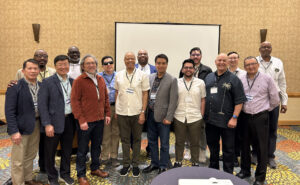
For many years now, the church has relied on pragmatism. We have more books, conferences, and podcasts resourcing us with strategic approaches to ministry leadership. Much of what is produced today focuses on the Xs and Os of ministry execution. There’s nothing wrong with practical approaches to ministry, but relying on them to fulfill the Great Commission is pragmatism.

One area in which we see the great deficiency of pragmatism is in our evangelism. We have more evangelism strategies and programs than ever before, but we are seeing fewer people living on mission and sharing their faith. In many churches, evangelism is nonexistent from the pulpit to the pew. Why do we have methods but no messengers? How are there so many programs but so little passion? We have chosen pragmatism over prayer! I truly believe the reason we are not seeing a culture of evangelism in our churches is the absence of evangelistic praying.
More than the other gospels, Luke emphasizes the prayers of Jesus. Jesus’ ability to accomplish His redemptive work was empowered by a vibrant prayer life, enabling Him to live in the fullness of the Spirit. In the sequel to Luke, the book of Acts, the early church was an extension of Jesus’ ministry. In Acts, the church lived on mission daily by walking in the supernatural power of the Holy Spirit and through prayer. The spread of the gospel was not driven by pragmatism, but by prayer.
Let me share four truths from Luke and Acts for choosing prayer over pragmatism:
Jesus’ life and ministry were empowered by the Holy Spirit through prayer.
We see Jesus consistently withdrawing to pray. One significant moment happened when Jesus was fasting and praying for 40 days. Upon His return, Jesus begins His ministry. Every time Jesus went away to pray, He was then led by the Spirit to proclaim the gospel. Life on mission is never accomplished by human effort, but by the Holy Spirit as we seek Him in prayer.
Prayer mobilizes people toward evangelism.
In Luke 10, Jesus shows us there are plenty of lost people to be reached but few who will go and share. His solution was not an evangelism class or an equipping seminar. Jesus instructs us to pray for God to move in people and send them to proclaim the gospel. Teaching and equipping can instruct the mind, but they cannot transform the heart. Only God can!
The effectiveness of evangelism happens through the Holy Spirit in prayer.
In Luke 24:46–49, Jesus calls His disciples to be gospel witnesses to all nations. But in v.49, He tells them they must wait before they go. Wait for what? For the Holy Spirit to “clothe them with power from on high.” Luke recalls this in Acts 1 when Jesus says they need to receive the power of the Holy Spirit to become His witnesses (v.8) and, again, in Acts 2 when the result of their 10-day prayer meeting was receiving the gift and the filling of the Holy Spirit. Our methods might be helpful, but they are not powerful. They may be useful, but they are not substitutes for the Holy Spirit.
Praying for the lost leads to sharing with the lost.
In Acts 4, the church was under persecution—not in general, but for evangelism specifically. How did they respond? They prayed! In v.29, they prayed to “continue to speak [His] Word with boldness.” They prayed for evangelistic courage, asking God for His power to use them to see the gospel proclaimed and people saved. God answered in a big way. Not only were they given boldness, but God saved the lost. When God’s people pray for the lost, it always leads to sharing with the lost.
If we want the church to live evangelistically and the lost to experience the saving work of Jesus, we must become a people who pray. Methods are helpful, strategies are beneficial, but the Holy Spirit is essential.

















